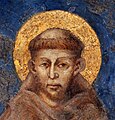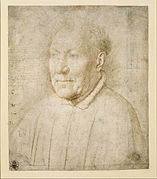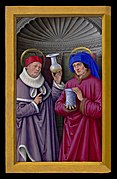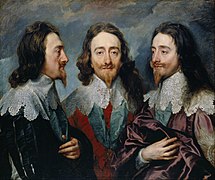Portal:Saints
|
THE SAINTS PORTAL
Showcased saint-related contentIn Christian belief, a saint is a person who is recognized as having an exceptional degree of holiness, likeness, or closeness to God. However, the use of the term saint depends on the context and denomination. In Catholic, Eastern Orthodox, Anglican, Oriental Orthodox, and Lutheran doctrine, all of their faithful deceased in Heaven are considered to be saints, but a select are considered worthy of greater honor or emulation. Official ecclesiastical recognition, and consequently a public cult of veneration, is conferred on some denominational saints through the process of canonization in the Catholic Church or glorification in the Eastern Orthodox Church after their approval. In many Protestant denominations saint refers broadly to any holy Christian, without special recognition or selection. While the English word saint (deriving from the Latin sanctus) originated in Christianity, historians of religion tend to use the appellation "in a more general way to refer to the state of special holiness that many religions attribute to certain people", referring to the Jewish ḥasīd or tzadik, the Islamic walī/ fakir, the Hindu rishi, Sikh bhagat or guru, the Shintoist kami, the Taoist shengren, and the Buddhist arhat or bodhisattva also as saints. Depending on the religion, saints are recognized either by official ecclesiastical declaration, as in the Catholic faith, or by popular acclamation (see folk saint). (Full article...) Selected biography
Saint Cædmon /kædmɒn/ is the earliest English poet whose name is known. An Anglo-Saxon herdsman attached to the double monastery of Streonæshalch (Whitby Abbey-pictured) during the abbacy of St. Hilda (657–680), he was originally ignorant of "the art of song" but supposedly learned to compose one night in the course of a dream. He later became a zealous monk and an accomplished and inspirational religious poet.
Cædmon is one of twelve Anglo-Saxon poets identified in medieval sources, and one of only three for whom both roughly contemporary biographical information and examples of literary output have survived. His story is related in the Historia ecclesiastica gentis Anglorum ("Ecclesiastical History of the English People") by St. Bede who wrote, "[t]here was in the Monastery of this Abbess a certain brother particularly remarkable for the Grace of God, who was wont to make religious verses, so that whatever was interpreted to him out of scripture, he soon after put the same into poetical expressions of much sweetness and humility in English, which was his native language. By his verse the minds of many were often excited to despise the world, and to aspire to heaven." Did you know...
Selected saint days
General imagesThe following are images from various saint-related articles on Wikipedia.
CategoriesRelated portalsWikiProjects The Saints Wikiproject aims primarily at standardizing the articles about people venerated by some Christians as saints or the blessed and ensuring quality articles. If there is an interest in including saints from religions other than Christianity, please propose those changes on our talk page. Related topicsSaints: Saint Michael - Saint Gabriel - Virgin Mary - Saint Joseph - Saint John the Baptist - Saint Stephen - Saint Peter - Saint Paul - Saint Augustine of Hippo  Traditions: Calendar of saints - Hagiography - List of saints - Symbology of the Saints Theology: Communion of Saints - Intercession of saints - Martyrs - Patron saint Roman Catholicism: Congregation for the Causes of Saints - Servant of God - Venerable - Beatification - Canonization Muslim Sufi saints: 'Abd al-Qadir al-Jilani - Ahmad al-Rifa'i - Ibrahim al-Disuqi - Ahmad al-Badawi - Al-Shadhili - Baha' al-Din Naqshband - Ibn 'Arabi - Wali Sanga Recognized content
Featured articlesGood articles
Featured pictures
Former featured pictures
Things to doAssociated WikimediaThe following Wikimedia Foundation sister projects provide more on this subject:
Discover Wikipedia using portals |



















































